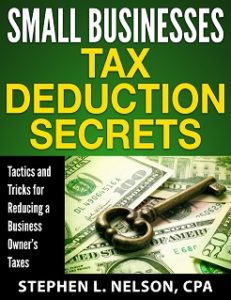If you’re trying to do the accounting for a new small business corporation for the first time, figuring out how to pay a shareholder can be confusing. Fortunately, however, paying shareholders is (in most cases) really easy—and very much like paying anyone else.
The trick to making shareholder payment bookkeeping easy is to spot those transactions where the shareholder isn’t really getting paid as a shareholder, but as an employee, vendor, or landlord. But let me explain:
Paying a Shareholder as an Employee
If you want to pay a shareholder for work the shareholder has performed as an employee, you pay the shareholder just like you pay any other employee.
This means, if you’re using a payroll service like ADP or Paychex, that you add the shareholder-employee to the payroll system and pay the shareholder-employee just like any other employee. Note that the corporation in this case needs to have all the usual payroll information for the shareholder-employee—just as the corporation needs all the usual payroll information to pay any “normal” employee.
Note: Our Five Minute Payroll System ebook describes how an S corporation with a single shareholder-employee can easily and economically do payroll. Here’s link to page with more information.
A couple of other notes: First, note that amounts paid to a shareholder for wages get categorized within the accounting system as “wages expense” or “officer wages expense.”
Second, the Circular E publication, available at the www.irs.gov website, provides lots of information and detailed instructions for how to make payroll calculations.
Reimbursing a Shareholder for Business Expenses
Sometimes a corporation will need to pay a shareholder for amounts he or she expended on behalf of the corporation. When a corporation wants to make this sort of reimbursement, you just treat the payment like any other payment to a vendor.
For example, if you write a $100 check to the local office supplies store for paper, you just record that check within the accounting system as a $100 office supplies expense. If you need to reimburse a shareholder for $100 of office supplies he or she bought, you would just write a check to the shareholder and then record the check within the accounting system as a $100 office supplies expense.
In other words, it doesn’t make any difference whether you pay $100 to the local office supplies store for office supplies or whether you pay $100 to a shareholder to reimburse him or her for $100 of office supplies spending.
 Tip: If you’re not good about maximizing your small business’s tax deductions, you want to get better about that.
Tip: If you’re not good about maximizing your small business’s tax deductions, you want to get better about that.
Knowing and following the rules can save you thousands of dollars a year… or more.
If you want help or need more information about how to take advantage of these “secrets hidden in plain sight,” consider our popular downloadable ebook “Small Business Tax Deduction Secrets“.
Rental Payments to Shareholders
If a corporation pays rent to a shareholder–perhaps for use of real or personal property–the payment is rent and the corporation’s books need to clearly show such. In this case, someone who is a landlord “just happens” to also be a shareholder. But the rent payments look like rent payments. Period.
Note: Rental expenses payments made by a corporation to a shareholder count as deductions on the corporation’s tax return. But there’s no “tax loophole” here. The rental payments received by the shareholder count as income on the shareholder’s personal tax return.
Shareholder Dividend and Distribution Payments
When a corporation pays a shareholder a dividend or distribution, the payment needs to be categorized not as an expense or a tax deduction but a draw, or reduction, in retained earnings.
If you’re using an accounting program like QuickBooks, you want to look for an owner’s equity account called something like “dividends” or “distributions” or “draws” to use for shareholder dividend or distribution payments.
Note: Technically, a payment to an S corporation shareholder, if made out of S corporation profits, is called a distribution. A payment to a C corporation shareholder, if made out of the C corporation profits, is called a dividend. And draws are payments made out of capital to sole proprietors in a sole proprietorship or partners in a partnership. People use these terms rather interchangeably however.
Setting S Corp Shareholder Salaries?
To maximize the tax savings from an S corporation, you need to minimize the salary paid to shareholder employees. But this decision is tricky.
Set the salary too low and you run the risk of an IRS examination and then penalties. Set the salary too high, however, and the situation is even worse. You needlessly overpay your payroll taxes.
If you’re perplexed by this tax decision, get expert help in my short, easy-to-understand ebook, Setting Low Salaries for S Corporations. But do note: If you’re a CPA firm client, you don’t need to purchase this ebook. Just email us and ask for your free copy.
